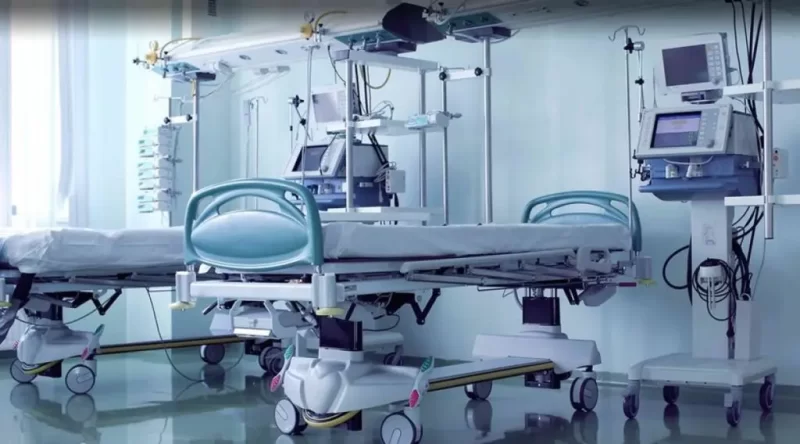ICU Full Form: ICU, the abbreviation, stands for Intensive Care Unit, abbreviated as ICU. It is a specialized section within a hospital that is equipped with spacious, high-intensity care beds and staffed by a team of extensively trained medical professionals who monitor patients continuously. This unit is specifically designed to offer the highest level of care to patients, typically those with life-threatening conditions who require intensive medical attention.
ICU Full Form: Definition and Purpose
ICU Full Form:- The Intensive Care Unit, commonly referred to as ICU, comprises several rooms housing beds, essential medical apparatus, and a centralized nursing station. It serves as a critical area where healthcare providers administer care to severely ill patients. Patients in the ICU necessitate constant monitoring and may require interventions such as oxygen therapy or surgical procedures, particularly when combating infections or other acute medical crises.
Upon stabilization, patients are discharged from the ICU and typically transitioned back to standard hospital care. The presence of an ICU significantly aids in expediting patient recovery. Moreover, each ICU within different medical facilities may specialize in treating particular conditions or diseases, thereby enhancing the quality of care provided.
ICU and its Impact on Healthcare Systems | ICU Full Form
ICUs pose significant challenges to healthcare systems worldwide due to their specialized nature and associated costs. Many health insurance plans do not fully cover the extensive services offered by ICU facilities, resulting in financial burdens for patients. The provision of advanced medical treatments and procedures within ICUs incurs substantial expenses, often leading to additional charges for prolonged stays.
Despite these challenges, ICUs remain pivotal in delivering crucial care to patients in critical condition. They accommodate a range of medical needs and employ specialized medical professionals who administer advanced therapies and interventions. However, the escalating number of ICU admissions coupled with rising treatment costs present ongoing budgetary concerns for healthcare providers.
Significance of ICU: A Closer Look
ICUs serve as essential facilities for treating patients who cannot be adequately managed in standard hospital settings, particularly those with severe injuries or complex medical conditions. Additionally, they function as post-operative recovery units, aiding patients in recuperating from surgical procedures. Common conditions treated in ICUs include infections, cardiac ailments, neurological disorders, and respiratory distress, among others.
The necessity of ICU admission arises when individuals face life-threatening situations or require intensive medical intervention. Prompt access to specialized care within an ICU setting significantly enhances patients’ chances of recovery and survival, underscoring the critical role these units play within the broader healthcare landscape.
Key Features of ICU Facilities
ICUs serve as comprehensive care centers where various medical specialties collaborate to deliver advanced treatment modalities. These units are meticulously designed to ensure patient safety and comfort, ranging from single-bed setups to larger facilities accommodating multiple patients. With a dedicated team of physicians, nurses, and support staff, ICUs offer state-of-the-art equipment and specialized care tailored to high-risk patients’ needs.
Moreover, ICUs prioritize patient rehabilitation and strive to create a healing environment conducive to recovery. By integrating multidisciplinary care approaches, these units optimize patient outcomes and facilitate a seamless continuum of medical care.
Exploring ICU: Understanding its Functionality
Intensive care encompasses a range of medical interventions aimed at preserving vital organ function and mitigating complications. Common procedures performed in ICUs include intubation for mechanical ventilation, which aids in maintaining adequate oxygenation levels, and the placement of drainage tubes to manage fluid accumulation in the lungs. While temporary in nature, these interventions are essential in stabilizing patients’ conditions and facilitating recovery.
ICU facilities are typically located within hospitals and cater to patients recovering from surgical procedures or experiencing acute medical crises. The specialized care provided within these units ensures optimal patient management and fosters favorable clinical outcomes.
The Necessity of ICUs: Ensuring Critical Care
ICUs play a crucial role in delivering specialized care to critically ill patients within hospital settings. Patients with severe injuries or life-threatening illnesses require constant monitoring and intensive medical interventions, which ICUs are uniquely equipped to provide. A multidisciplinary team of healthcare professionals collaborates to deliver personalized care, ensuring timely interventions and optimal patient outcomes.
Despite the inherent risks associated with ICU care, stringent protocols and regular patient assessments mitigate potential complications. Different types of ICUs cater to diverse patient populations, ranging from those requiring short-term critical care to individuals necessitating prolonged medical management.
ICUs and Patient Care: A Comprehensive Approach
ICUs offer a spectrum of services aimed at facilitating patient recovery and promoting overall well-being. While some patients may require extended stays in the ICU, the ultimate goal is to improve their health status and enhance their quality of life upon discharge. Various healthcare professionals, including emergency, critical care, and surgical specialists, collaborate to deliver comprehensive care tailored to individual patient needs.
Each member of the medical team plays a unique role in patient care, ensuring holistic management and favorable clinical outcomes. Despite the challenges inherent in ICU settings, dedicated healthcare providers strive to optimize patient outcomes and deliver compassionate, evidence-based care.
Conclusion: ICU Full Form
In conclusion ICU Full Form, ICUs serve as critical components of modern healthcare systems, providing essential care to patients in need. These units offer specialized treatment modalities and comprehensive interventions tailored to individuals facing life-threatening conditions. By prioritizing patient safety and well-being, ICUs play a vital role in optimizing clinical outcomes and fostering patient recovery. Despite the challenges they pose, ICUs remain indispensable in ensuring the delivery of high-quality, specialized care to those in critical need within hospital settings.

